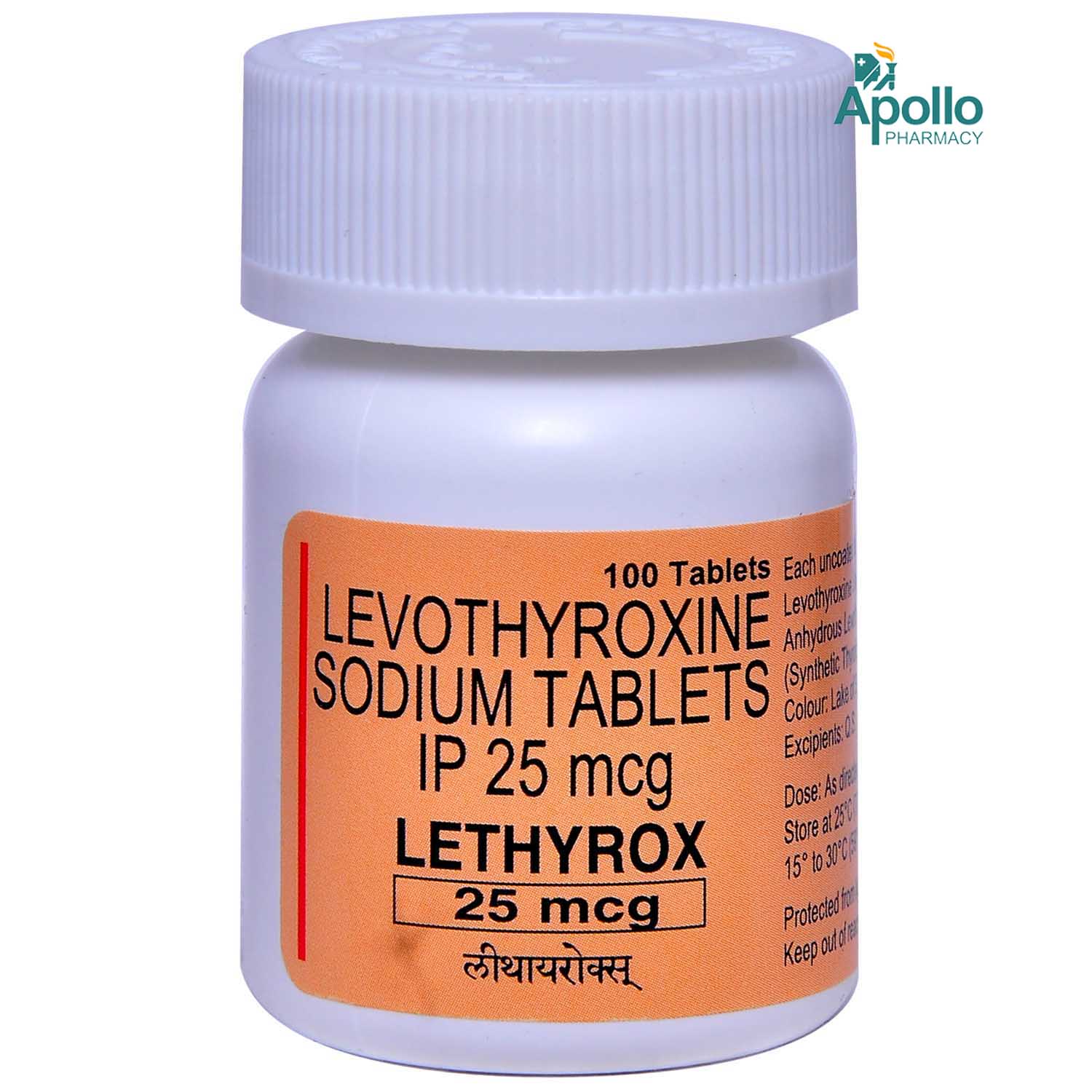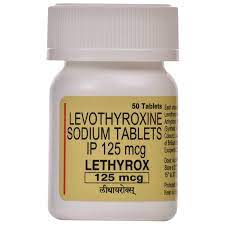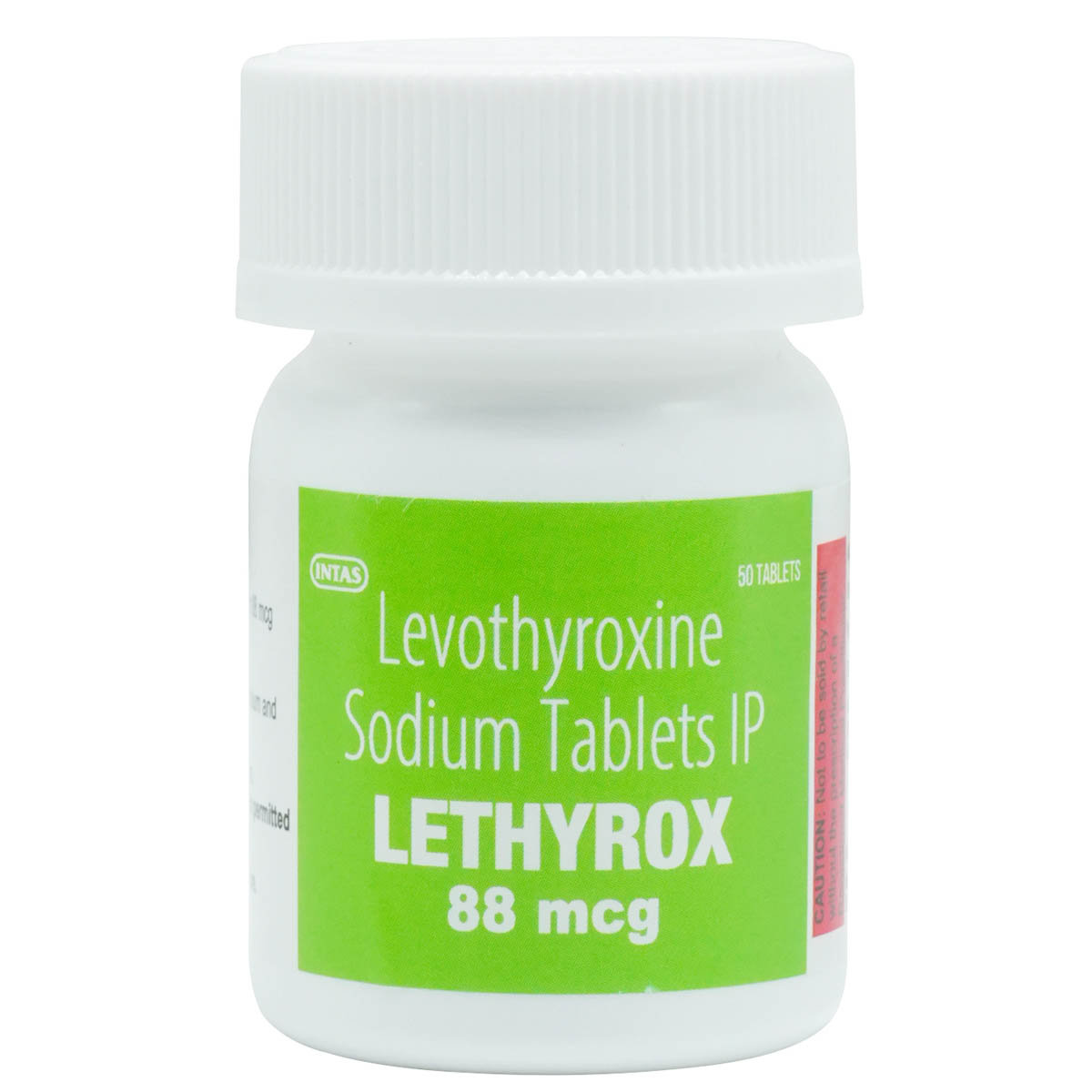Levothyroxine Sodium
About Levothyroxine Sodium
Levothyroxine Sodium is used to indicate the treatment of hypothyroidism or low secretion of thyroid hormone. Hypothyroidism is a chronic condition when the thyroid gland does not make enough thyroid hormones to meet your body’s needs.
Levothyroxine Sodium contains Levothyroxine sodium, which works by replacing the body's normally produced thyroid hormone. It minimizes symptoms of low thyroid hormone-like unknown weight gain, fatigue, and sensitivity to the cold.
In some cases, Levothyroxine Sodium may cause side effects like headache, weight loss, diarrhoea, irritability and nervousness. Most of these side effects may not require medical attention and may be resolved gradually over time. However, if the side effects persist or worsen, consult the doctor.
Your doctor may prescribe calcium or vitamin D supplements alongside Levothyroxine Sodium for your bone health. People affected with diabetes taking Levothyroxine Sodium may have altered blood glucose control that may result in increased antidiabetic agents or insulin requirements. Hence, it is recommended that people with diabetes should contact a doctor and carefully monitor their glucose level after starting, changing or discontinuing thyroid hormone therapy.
Uses of Levothyroxine Sodium
Medicinal Benefits
Levothyroxine Sodium is primarily indicated for the treatment of hypothyroidism or low secretion of thyroid hormone. It comprises levothyroxine, which is a synthetic thyroid hormone that is chemically similar to thyroxine, which is produced by our thyroid glands. Levothyroxine helps to replace missing thyroid hormones and/or relieve stress on the thyroid gland. Levothyroxine Sodium minimizes symptoms of low thyroid hormones like unknown weight gain, fatigue, sensitivity to the cold and many more. Thus, it helps in replacing the body's own natural thyroid hormone, which is essential for maintaining both mental and physical health.
Directions for Use
- Levothyroxine Sodium should be taken on an empty stomach, 30 minutes to 1 hour before your first meal or breakfast.
- Follow your doctor's instructions on the dosage and timing of this medication.
- Swallow Levothyroxine Sodium as a whole with a glass of water.
- Do not crush, break, or chew it.
Storage
Side Effects of Levothyroxine Sodium
- Irregular heartbeat (palpitations)
- Muscle spasm
- Headache
- Nervousness
- Irritability
- Sleeplessness
- Tremors
- Muscle weakness
- Increased appetite
- Weight loss
- Diarrhoea
Drug Warnings
Foods like soybean flour, cottonseed meal, cabbage, cauliflower, walnuts, dietary fibre, calcium and calcium-fortified juices may affect the working of Levothyroxine Sodium. Hence, avoid the intake of these foods within several hours of dosing if possible. Levothyroxine Sodium should not be administered to patients with acute myocardial infarction and high blood pressure patients. So, close clinical monitoring of heart function is recommended before taking Levothyroxine Sodium.
Drug Interactions
Drug-Drug Interaction: Medicines like appetite suppressant (phentermine), acidity medicine (esomeprazole), anti-diabetic drug (metformin), calcium/vitamin D, neuro-related medicine (amphetamine/dextroamphetamine), Antidepressant(amitriptyline, imipramine, dosulepin), Beta Blockers (propranolol, atenolol and sotalol), Anti-convulsants (carbamazepine, primidone and phenytoin), interact with Levothyroxine Sodium. So, if you are taking these medicines make sure you contact your doctor before taking Levothyroxine Sodium.
Drug-Food Interaction: If you are taking any homoeopathic, ayurvedic, Unani or any OTC items let your doctor know about this. These medicines may interact with Levothyroxine Sodium and affect its working. Besides this, absorption of Levothyroxine Sodium may be decreased by foods like soybean flour, cottonseed meal, walnuts, dietary fibre, calcium and calcium-fortified juices. So, try to avoid these foods if possible.
Drug-Disease Interaction: Thyroid hormones increase the workload of the heart and oxygen consumption of the body. Hence, a Levothyroxine Sodium should be taken with caution in the heart patients (cardiovascular disorders) like high blood pressure, chest pain (angina) and coronary artery disease. You should have regular monitoring of heart function. If chest pain occurs frequently contact the doctor so that doctor may reduce the dosage.
Drug-Drug Interactions Checker List:
Safety Advice

Alcohol
cautionYou are recommended not to consume alcohol along with Levothyroxine Sodium to avoid unpleasant side-effects.

Pregnancy
safe if prescribedOnly consume Levothyroxine Sodium, if you are prescribed by a doctor. However, the need for levothyroxine may increase during pregnancy due to increased blood levels of oestrogen (female sex hormone) hence, monitoring of thyroid function should be done regularly both during and after pregnancy. In this case, thyroid hormone dose can be adjusted by your doctor.

Breast Feeding
safe if prescribedEven during high dose levothyroxine therapy, the amount of Levothyroxine Sodium passing into the breast milk during lactation is very low and therefore harmless. However, if you have any doubt consult a doctor.

Driving
safe if prescribedLevothyroxine Sodium does not interfere with your ability to drive.

Liver
safe if prescribedLevothyroxine Sodium can be taken in the prescribed dose as it does not affect the liver.

Kidney
cautionLevothyroxine Sodium can be taken in the prescribed dose as it does not affects the kidney. However patient with adrenal gland complication or problem should consult a doctor before its intake.

Children
safe if prescribedLevothyroxine Sodium can be given to the children (new-borns and infants) with inborn thyroid hormone deficiency. To achieve normal mental and physical development. The doctor would adjust the dose individually according to the thyroid hormone level and TSH values measured in blood.
Habit Forming
Diet & Lifestyle Advise
- Eating the right nutrients and taking a regular dose of your prescribed medications may help reduce your symptoms and improve your thyroid function. Iodine, zinc and selenium are beneficial for people with hypothyroidism. However, it’s best to avoid iodine and selenium supplements unless your doctor advises you to take them.
- In hypothyroidism, there is usually a loss of calcium (hypocalcemia) and Vitamin D in our body. In such a case, people affected with hypothyroidism should opt for calcium-enriched foods.
- People with hypothyroidism usually have a slower metabolism, and eating more protein may help boost your metabolism.
- Daily yoga and aerobics exercises can help in boosting the metabolism.
- People with hypothyroidism should prefer the intake of more vegetables, fruits and lean meats. These foods are low in calories and may help prevent weight gain.
- Avoid taking Goitrogens (agents which interfere with the normal function of the thyroid gland), which generally include soy foods (tofu), cabbage, broccoli, kale, cauliflower, spinach, sweet potatoes, cassava, peaches, strawberries, millet, pine nuts, peanuts, etc.
Special Advise
- Doses beyond the range may produce serious or even life-threatening manifestations of toxicity. Thus, if you forget to take Levothyroxine Sodium anytime, take the medicine as soon as you remember to take it. However, if it is almost time for your next dose, you should avoid the skipped dose and continue with your regular regime as advised by your doctor.
- Levothyroxine Sodium should not be used for the treatment of obesity or for weight loss.
- Patients with adrenaline or pituitary gland problems, heart diseases, diabetes, and clotting disorders should not take Levothyroxine Sodium without consulting a doctor, as the dose may need to be adjusted.
- Diabetes patients taking Levothyroxine Sodium should contact the doctor before starting this medicine as it may worsen glycaemic control and may result in increased antidiabetic pills or insulin therapy.
- Regular intake of Levothyroxine Sodium may decrease bone mineral density, particularly in post-menopausal women. Hence, consult your doctor, who might prescribe the lowest dose possible for your bone health.
- If you are taking Levothyroxine Sodium prior to any surgery, let your doctor know.
- Thyroid function tests are usually done on an empty stomach after overnight (6-8 hrs) fasting.
- Patients with rare hereditary problems of galactose intolerance, the Lapp lactase deficiency or glucose-galactose malabsorption should not take this medicine.
Patients Concern
Disease/Condition Glossary
Hypothyroidism/underactive thyroid: It is a chronic condition when the thyroid gland does not make enough thyroid hormones to meet your body’s needs. When there is a low level of thyroid hormones, our body’s functions and metabolism slow down. Symptoms of hypothyroidism include fatigue, increased sensitivity to cold, constipation, dry skin, unexplained weight gain, puffy face, hoarseness of voice and muscle weakness. There may be a loss of Calcium and Vitamin D in some cases of hypothyroidism.
FAQs
Levothyroxine Sodium is indicated for the treatment of hypothyroidism or low secretion of thyroid hormone. It works by replacing the body's normally produced thyroid hormone.
No. Levothyroxine Sodium is only indicated for hypothyroidism and not for weight loss.
No. Levothyroxine Sodium should be not be taken with food. Please take it empty stomach at least half an hour before tea/coffee/breakfast in the morning.
If you observe symptoms like sudden weight gain, fatigue, increased sensitivity to cold, dry skin, constipation, puffy face, muscle weakness, anxiety or voice hoarseness. You should consult an Endocrinologist/Physician for further treatment.
Your thyroid hormone may vary depending on your age, sex, and condition (like pregnancy, chronic condition or complication). For example, a 30-year-old woman may have normal TSH around 4.2 mU/L, while a 90-year-old man may reach 8.9 mU/L at their upper limits. Besides this, your level of stress, diet, and medications and menses period can fluctuate your level of thyroid hormone.
Yes. Limit salt intake less than 2300 mg daily. Too much salt intake can increase your blood pressure especially when you have an underactive thyroid.
Yes. Based on the thyroid profile test, an Endocrinologist may advise a pregnant woman to take a high dose of Levothyroxine Sodium to meet the high-level thyroid hormone requirement. Treatment of underactive thyroid is vital during pregnancy, as low levels of thyroid hormone in the mother may harm both mother and baby.
A TSH test can be done once a year in case of hypothyroidism or under active thyroid to check whether your thyroid hormone levels are in normal range or not.
Do not take double doses in case you missed the dose of Levothyroxine Sodium. If accidentally you have taken too much of Levothyroxine Sodium, it may cause side effects like nervousness, insomnia, mild elevation of temperature, blood pressure elevation or loose stools. In this case immediately contact the doctor and take only when your doctor has allowed to take it.
Pregnant women with uncontrolled hypothyroidism or underactive thyroid can get low haemoglobin (anaemia), high blood pressure, muscle pain and weakness. Besides this, it can also cause an increased risk of miscarriage, premature birth (before 37 weeks of pregnancy) or even stillbirth. Also, untreated hypothyroidism during pregnancy can cause hypothyroid even in the baby. So, it is advisable to consult an endocrinologist if you are diagnosed with hypothyroidism.
Hair loss may occur during the first few months of treatment. This effect is usually temporary as your body adjusts to this medication. If this effect persists or worsens, tell your doctor for further treatment.
Long term use of Levothyroxine Sodium may cause decreases bone mineral density. Consult your doctor for further advice.
Take Levothyroxine Sodium preferably 30 minutes before breakfast, to ensure the best absorption. Always follow your doctor’s instructions and do not exceed the recommended dose.
You are recommended not to stop Levothyroxine Sodium on your own as it may cause symptoms to worsen and may lead to failure of the treatment in the future.
You are recommended to take the advice of a doctor if you are taking other medications, as it can impact the absorption or effectiveness of Levothyroxine Sodium. Inform your doctor about all medicines you are currently taking before you start taking Levothyroxine Sodium to avoid possible interactions
You are recommended to take Levothyroxine Sodium as long as your doctor advises, as it is typically prescribed for long-term use and may need to be taken for lifelong. Do not stop the medication, as symptoms of low thyroid hormone levels may return.
Levothyroxine Sodium can be given to children only if advised by the doctor. Do not give Levothyroxine Sodium to your child on your own.
Levothyroxine Sodium should be taken as advised by the doctor. Swallow it as whole with a glass of water. Do not crush or chew it.
People with diabetes who take Levothyroxine Sodium may experience increased blood sugar levels, potentially requiring higher doses of antidiabetic medications or insulin. Therefore, it is advised that they consult a doctor and closely monitor their blood glucose levels when starting, changing, or stopping thyroid hormone treatment.
Thyroxine (T4) is a thyroid hormone that regulates metabolism, energy, and growth. It plays a key role in regulating body weight, internal temperature, energy levels, metabolism, hair, skin and nail growth. Also, it is important for brain development, heart and muscle function, and maintenance of bones. Balanced levels are important, as low levels can cause fatigue and weight gain, while high levels can lead to anxiety and heart issues.
Oral contraceptives containing estrogen and progesterone may lower the levels of Levothyroxine Sodium in your body, potentially requiring an increase in your Levothyroxine Sodium dose to maintain effective thyroid hormone levels.
Levothyroxine Sodium includes side effects such as muscle spasms, headache, nervousness, irritability, sleeplessness, tremors, muscle weakness, weight loss, diarrhoea. These do not require any medical treatment as they will gradually reduce over time. However, please consult the doctor if side effects persist longer.






